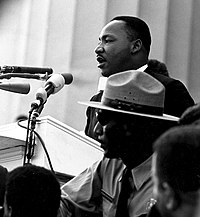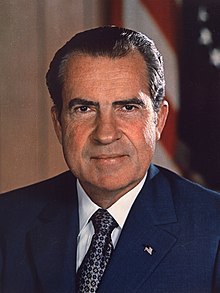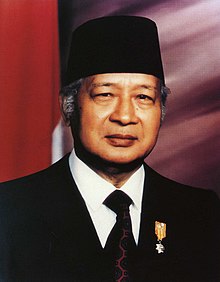Portal:1960s
The 1960s Portal
The 1960s became synonymous with the new, radical, and subversive events and trends of the period. In Africa the 1960s was a period of radical political change as 32 countries gained independence from their European colonial rulers. Some commentators have seen in this era a classical Jungian nightmare cycle, where a rigid culture, unable to contain the demands for greater individual freedom, broke free of the social constraints of the previous age through extreme deviation from the norm. Christopher Booker charts the rise, success, fall/nightmare and explosion in the London scene of the 1960s. However, this alone does not explain the mass nature of the phenomenon. Several nations such as the U.S., France, Germany and Britain turned to the left in the early and mid 1960s. In the United States, John F. Kennedy, a Keynesian and staunch anti-communist, pushed for social reforms. His assassination in 1963 was a stunning shock. Liberal reforms were finally passed under Lyndon B. Johnson including civil rights for African Americans and healthcare for the elderly and the poor. Despite his large-scale Great Society programs, Johnson was increasingly reviled by the New Left at home and abroad. The heavy-handed American role in the Vietnam War outraged student protestors across the globe, as they found peasant rebellion typified by Ho Chi Minh and Che Guevara more appealing. Italy formed its first left-of-center government in March 1962 with a coalition of Christian Democrats, Social Democrats, and moderate Republicans. Socialists joined the ruling block in December 1963. In Britain, the Labour Party gained power in 1964. In Brazil, João Goulart became president after Jânio Quadros resigned. This is a Featured article, which represents some of the best content on English Wikipedia..
 The 1969 Curaçao uprising (Papiamento: Trinta di Mei, 'Thirtieth of May') was a series of riots on the Caribbean island of Curaçao, then part of the Netherlands Antilles, a semi-independent country in the Kingdom of the Netherlands. The uprising took place mainly on May 30, but continued into the night of May 31 – June 1, 1969. The riots arose from a strike by workers in the oil industry. A protest rally during the strike turned violent, leading to widespread looting and destruction of buildings and vehicles in the central business district of Curaçao's capital, Willemstad. Several causes for the uprising have been cited. The island's economy, after decades of prosperity brought about by the oil industry, particularly a Shell refinery, was in decline and unemployment was rising. Curaçao, a former colony of the Netherlands, became part of the semi-independent Netherlands Antilles under a 1954 charter, which redefined the relationship between the Netherlands and its former colonies. Under this arrangement, Curaçao was still part of the Kingdom of the Netherlands. Anti-colonial activists decried this status as a continuation of colonial rule but others were satisfied the political situation was beneficial to the island. After slavery was abolished in 1863, black Curaçaoans continued to face racism and discrimination. They did not participate fully in the riches resulting from Curaçao's economic prosperity and were disproportionately affected by the rise in unemployment. Black power sentiments in Curaçao were spreading, mirroring developments in the United States and across the Caribbean, of which Curaçaoans were very much aware. The Democratic Party dominated local politics but could not fulfill its promise to maintain prosperity. Radical and socialist ideas became popular in the 1960s. In 1969, a labor dispute arose between a Shell sub-contractor and its employees. This dispute escalated and became increasingly political. A demonstration by workers and labor activists on May 30 became violent, sparking the uprising. (Full article...)This is a Good article, an article that meets a core set of high editorial standards.
The Indiana State Fairgrounds Coliseum gas explosion took place in Indianapolis, Indiana, United States, on October 31, 1963; 81 people died and about 400 others were injured. It was one of the worst disasters in the history of the state. On the night of October 31, over 4,000 people were in the Indiana State Fairgrounds Coliseum to watch a Holiday on Ice performance. While this was happening, liquefied petroleum gas was leaking from a tank that was stored with several others in a supply room underneath a part of the grandstands. Shortly after 11 p.m. ET, the gas came into contact with an electrical heating element from the concessions area, causing a major explosion that killed many seated above the room and caused significant damage to the stands. After the initial blast, while people were evacuating, a second blast caused by the remaining, unexploded tanks caused further destruction. Firefighters and other emergency responders were at the site within minutes and survivors were transported via ambulance to various hospitals in the area. The gas tanks were discovered by firefighters during cleanup operations and later testing revealed that they were the cause of the explosion. (Full article...)Selected picture - Malcolm X was an American Black Muslim minister and a spokesman for the Nation of Islam. Born Malcolm Little, he changed his surname to "X" as a rejection of his "slave name". Tensions between him and the Nation of Islam caused him to break from the group in 1964. He claimed to have received daily death threats and his house was burned to the ground in February 1965. One week later, Malcolm X was assassinated, having been shot in the chest by a sawed-off shotgun and 16 times with handguns. Three members of the Nation of Islam were convicted.
Did you know -
Related portalsThis is a Featured article, which represents some of the best content on English Wikipedia..
Richard Milhous Nixon (January 9, 1913 – April 22, 1994) was the 37th president of the United States, serving from 1969 to 1974. A member of the Republican Party, he previously served as a representative and senator from California and as the 36th vice president from 1953 to 1961 under President Dwight D. Eisenhower. His presidency saw the reduction of U.S. involvement in the Vietnam War, détente with the Soviet Union and China, the Apollo 11 Moon landing, and the establishment of the Environmental Protection Agency and Occupational Safety and Health Administration. Nixon's second term ended early when he became the only U.S. president to resign from office, as a result of the Watergate scandal. Nixon was born into a poor family of Quakers in a small town in Southern California. He graduated from Duke Law School in 1937, practiced law in California, and then moved with his wife Pat to Washington, D.C., in 1942 to work for the federal government. After serving active duty in the Naval Reserve during World War II, he was elected to the House of Representatives in 1946. His work on the Alger Hiss case established his reputation as a leading anti-communist, which elevated him to national prominence. In 1950, he was elected to the Senate. Nixon was the running mate of Eisenhower, the Republican Party's presidential nominee in the 1952 election, and served for eight years as vice president. He narrowly lost the 1960 presidential election to the Democratic Party nominee John F. Kennedy; after his loss in the 1962 race for governor of California, he announced his retirement from political life. However, in 1968, he made another run for the presidency and defeated the Democratic incumbent vice president Hubert Humphrey. (Full article...)This is a Good article, an article that meets a core set of high editorial standards.
Suharto (/suːˈhɑːrtoʊ/ soo-HAR-toh, Indonesian: [suˈharto] ⓘ; 8 June 1921 – 27 January 2008) was an Indonesian military officer and politician, who served as the second and the longest serving President of Indonesia. Widely regarded as a military dictator by international observers, Suharto led Indonesia as an authoritarian regime from the fall of his predecessor Sukarno in 1967 until his resignation in 1998 following nationwide unrest. His 31-year dictatorship is considered one of the most brutal and corrupt of the 20th century, as he was central to the perpetration of mass killings against alleged communists, ethnic Chinese, irreligious people and trade unionists. Suharto was born in the small village of Kemusuk, in the Godean area near the city of Yogyakarta, during the Dutch colonial era. He grew up in humble circumstances. His Javanese Muslim parents divorced not long after his birth, and he lived with foster parents for much of his childhood. During the Japanese occupation era, Suharto served in the Japanese-organized Indonesian security forces. During Indonesia's independence struggle, he joined the newly formed Indonesian Army. There, Suharto rose to the rank of major general some time after full Indonesian independence was achieved. (Full article...)Selected article -Dr. Strangelove or: How I Learned to Stop Worrying and Love the Bomb (known simply and more commonly as Dr. Strangelove) is a 1964 political satire black comedy film co-written, produced, and directed by Stanley Kubrick and starring Peter Sellers in three roles, including the title character. The film, financed and released by Columbia Pictures, was a co-production between the United States and the United Kingdom. The film, which satirizes the Cold War fears of a nuclear conflict between the Soviet Union and the United States, also stars George C. Scott, Sterling Hayden, Keenan Wynn, Slim Pickens, and Tracy Reed, and is loosely based on the thriller novel Red Alert (1958) by Peter George, who also co-wrote the screenplay with Kubrick and Terry Southern. (Full article...)More Did you know (auto generated)
TopicsCategoriesWikiProjects
Associated WikimediaThe following Wikimedia Foundation sister projects provide more on this subject:
Discover Wikipedia using portals |




























